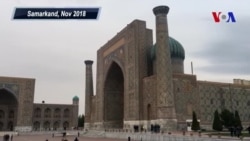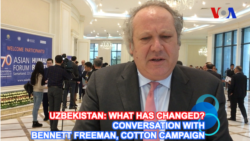In an exclusive interview with VOA, Bennett Freeman of the Cotton Campaign, international coalition to end forced labor in Uzbekistan, says that there has been significant progress since 2017 but major challenges remain. Strong commitment and realistic approach needed to fully resolve this deeply-rooted issue, Freeman argues.
Asian Forum on Human Rights, Samarkand, November 22, 2018
Navbahor Imamova, VOA Uzbek: What has changed in Uzbekistan? How do you see the current situation?
Bennett Freeman, Cotton Campaign: I see an Uzbekistan that is in transition from a system that, unfortunately, had been characterized by severe repression and corruption to a new Uzbekistan which is showing increasing respect for human rights, for labor rights, for civil society. As somebody who's been visiting Uzbekistan and engaging on human rights issues for nearly 20 years now since I was at the US Department of State in the late 1990s, I think that a remarkable, even historic transition is underway.
Navbahor Imamova, VOA Uzbek: We hear the word "progress" a lot in our conversations with both Uzbeks and those who are working with them. We've been hearing that word from the Cotton Campaign too.
We've seen significant progress but we've not yet achieved success.
Bennett Freeman, Cotton Campaign: Significant progress has been made under the new president. Significant commitments have been made, much remains to be done. I think that the country is at the early, not the late stages of this transition. It will take time to change a system that had been so deeply entrenched, not just throughout the independence period, but with deep structural roots in the Soviet period as well. This is a very hopeful time for Uzbekistan, and I think it's really a sign of the times that is Uzbekistan is hosting this important Asian Forum on human rights.
Navbahor Imamova, VOA Uzbek: Uzbekistan wants to end forced labor, as does the Cotton Campaign. What progress so far?
Bennett Freeman, Cotton Campaign: We've seen significant progress but we've not yet achieved success. The progress has been significant in a couple of ways. First, child labor has been more or less eliminated, and that it really was accomplished even a couple of years ago from the cotton sector. The real breakthrough came in mid 2017 when the president publicly acknowledged massive forced labor in the cotton sector going back decades and made a commitment to end it. It was that public acknowledgement and commitment that has been the sea-change.
There was some progress in the 2017 harvest, but still forced labor used on a very, very significant scale, and not surprisingly given that it takes much more than speeches and decrees to turn around such an entrenched system of production. We're seeing more progress now in 2018 harvest which has just been completed. We'll be looking carefully at the results of the monitoring being conducted by the ILO as well as by civil society allies of the cotton campaign especially by the Uzbek-German forum.
But much remains to be done. This is a process that will take several more years. The big breakthrough is the political commitment made at the top of this government, the opening up of civil society, the inclusion of human rights defenders in the monitoring process, the accountability that's been put forward and enforced in many instances in the part of regional and local officials.
The big breakthrough is the political commitment made at the top of this government...
So many big, big challenges remain to dismantle the quota system, to move the whole system of cotton production to the private sector towards mechanization, to reduce reliance on cotton as the agriculture sector is reformed. We can see the outlines of a much more hopeful future for the Uzbek people and for Uzbekistan internationally, both as an economy but also as a proud country as this reform process progresses.
Navbahor Imamova, VOA Uzbek: You spoke at the forum yesterday hosted by the Development Strategy Center and the International Labor Organization. How do you see their role in this process? Do you consider them partners? Do you want to work with them?
Bennett Freeman, Cotton Campaign: Well, the International Labor Organization, the ILO, plays an absolutely critical role. Indeed, it was the Cotton Campaign in its very early stages, in 2008, that called publicly for the Uzbek government to invite in the ILO to first undertake monitoring of the cotton harvest, and then to play a long-term role providing technical assistance.
For over 10 years now, we have supported this role for the ILO and we've been very gratified to see such a significant presence by the ILO. The ILO, of course, has unique legitimacy of capacity of any institution in the international community to be doing this work. We rely on its impartiality as an organization which brings together governments, employers and trade unions.
There are challenges for the ILO here. There's not real freedom of association. We need to see the emergence of independent trade unions. I think that will take some time, but is very, very important. The ILO is doing careful work on the ground aided by a human rights defenders working as monitors. We look to the ILO to be the impartial monitor and arbiter of the facts on the ground, that's what's most important, its impartial assessment of the facts on the ground. Only by understanding and assessing, analyzing those facts will we then have the basis to together sharpen the agenda for further reform.
There's not real freedom of association. We need to see the emergence of independent trade unions,
Navbahor Imamova, VOA Uzbek: We saw you talking with the members of the Uzbek government, specifically with Deputy Prime Minister Tanzila Narbaeva. What is your message to them? What do you want the Uzbek government to do right now?
Bennett Freeman, Cotton Campaign: We want the Uzbek government to continue to open up to civil society, to take seriously the role of civil societies. They're showing signs of doing just in the participation both here at the age of human rights forum, but also at the round table yesterday on the cotton issue in Tashkent. We also want the Uzbek government to continue the attitude that we've been hearing, that's been very encouraging of understanding that this is a process that takes time, that success cannot simply be declared or proclaimed, that success is only achieved through hard, consistent work on the ground.
I know that there is a real desire on the part of many in the Uzbek government to declare success and we want to get to that point sooner rather than later. But this is a difficult process.
I know that there is a real desire on the part of many in the Uzbek government to declare success and we want to get to that point sooner rather than later. But this is a difficult process. There is no system of production of any crop or commodity anywhere in the world that's been so deeply entrenched for so many decades that can simply be dismantled or eliminated within a year or two. It takes time.
What really matters here is a consistent commitment combined with a realistic sense of what is being achieved. The cotton campaign acknowledges the significant progress on the ground, but we also at the same time must also, and especially the ILO and the Uzbek government, continue to be realistic about not just the progress but the continuing challenges because there are many.
Navbahor Imamova, VOA Uzbek: Thank you for chatting with us.
Bennett Freeman, Cotton Campaign: My pleasure. Thank you!


































































Facebook Forum